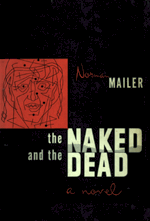Book Report: The Naked and the Dead
 So Norman Mailer published this book when he was 25. It was 1948. He'd spent time in the South Pacific during WWII, didn't see much action, but decided to write a 700+ page book about soldiers who do.
So Norman Mailer published this book when he was 25. It was 1948. He'd spent time in the South Pacific during WWII, didn't see much action, but decided to write a 700+ page book about soldiers who do. I griped earlier about his using flashbacks late in the book to round out characters who have been involved in the story for 400 pages. In the 600s, he was still doing that. Ok, again, if the reader hasn't figured out a character after 600 pages, a cliche-ridden, tedious flashback about how he came from a poor family, met a sweet girl, had these big dreams, then the war happened, well, that just isn't helpful.
That's my complaint. On the plus side, when we're actually on the island in the South Pacific, things move much better. The brutality with which he portrays the soldiers' lives feels honest and gripping, mostly because of the moral ambiguities his omniscient narrator effectively conveys. They're not good people faced with hard choices. They're people of mixed moral integrity making good and bad decisions.
The narration slips in and out of well over a dozen major characters' minds, rarely feeling patronizing. I was most surprised at how well Mailer achieves characters of diverse backgrounds: Martinez, the Mexican with complex emotions about the U.S.; Goldstein, the Jewish soldier alienated by the others; Roth, of Jewish background, but rallying against his Jewishness (the relationship between Roth and Goldstein, as well as the anti-Semitism of the other soldiers, is particularly compelling); Wilson, the Southerner who speaks in a drawl that could easily lapse into caricature, but doesn't; Hearn, the slightly effeminate 'college boy'; Gallagher, the former Communist from Boston; etc.
Good war novels usually necessitate a balance of character and action, told with authenticity. It was clear from reading the novel that Mailer had been in war in the South Pacific. It was also clear that he hadn't seen too much action; the apex of the story slides further from a war story and closer to an adventure tale. But that's a smart choice. Though I grew weary by the final chapters, and had trouble following minor details that earlier were perfectly lucid, the resolution felt appropriate and not forced. It's difficult to close a novel this long (see: the last 20 minutes of the third Lord of the Rings movie). Mailer does it.





0 Comments:
Post a Comment
<< Home